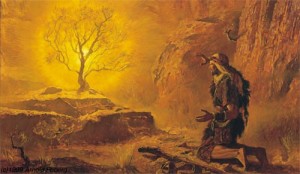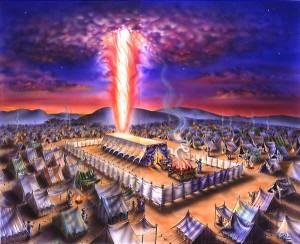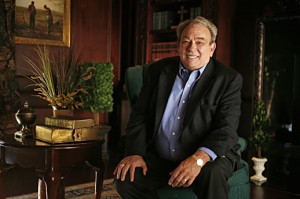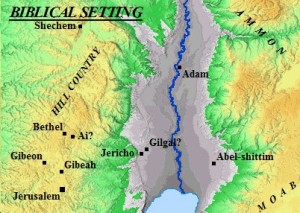 Steve Weaver is the pastor of Farmdale Baptist Church in Frankfort, KY. He is married to Gretta and they have been blessed by God with six children.
Steve Weaver is the pastor of Farmdale Baptist Church in Frankfort, KY. He is married to Gretta and they have been blessed by God with six children.
Some years ago, I read a series of six short articles Steve wrote (based on six sermons he preached) covering the big picture of what the Bible is all about. I thoroughly enjoyed Steve’s insights. Seeing the grand sweep of things is immensely helpful in allowing us to see where each of the details fit in the grand design. God has a plan and He will bring it about in the events of time. History is His story.
I recently read Pastor Steve’s series again and thought it would be very profitable to post at least some of it here. Here are the first two short posts:
Pastor Steve Weaver: The Story of the Bible – Part 1
 Everyone loves a good story! There is something about the words, “Once upon a time . . .” that capture the attention and the imagination of both young and old. We never outgrow our love for a story. This is clearly evident by American’s seemingly insatiable appetite for books, television and movies.
Everyone loves a good story! There is something about the words, “Once upon a time . . .” that capture the attention and the imagination of both young and old. We never outgrow our love for a story. This is clearly evident by American’s seemingly insatiable appetite for books, television and movies.
The Bible is often treated as merely a collection of many different stories with a moral lesson, a Christian version of Aesop’s Fables. While it is true that the Bible does contain many different stories and that most of them have a moral lesson, the Bible is much more than what it is often treated as. The Bible is one story, with one overarching message. That story is the most compelling one ever written. It is quite literally, “The Greatest Story Ever Told.” I like to summarize the message of the Bible this way: “The Bible is the story of a God who makes a spectacular promise about a supernatural Person who creates a special people to live in a supernal place with Him forever.” In my next five posts, I will be taking one of the main nouns from this sentence and showing how that theme is played out through the entire Bible.
Before we begin I must confess my indebtedness in my formulation of the above sentence to the works of the Australian Biblical theologian Graeme Goldsworthy who has very helpfully defined the kingdom of God as: “God’s people in God’s place under God’s rule.” I am also deeply indebted to Paul Helm’s children’s book titled The Big Picture Story Bible (one of my favorite books to help me understand and explain the Bible to my children) which describes the Bible as: “A big book, about a big God, who keeps a big promise.”
All good stories, we are told, must have characters, a plot, a setting, a conflict and a unifying theme. Well, the story of the Bible has it all!
For characters, this story has God, the Devil, and a cast of thousands.
For a plot, this story has the ebb and flow of the history of the nation Israel, and even the whole history of the world serves as a stage for the action in this cosmic drama of redemption.
For a setting, this story has the entirety of planet earth with heaven and hell in the balance.
For a conflict, this story has Satan in rebellion against God and God’s active work to destroy him forever. Relatedly, this story also has humanity in rebellion against God and God’s active work to redeem a people out of fallen humanity for Himself.
For a unifying theme, this story is the story about a God who makes a spectacular promise about a supernatural Person who creates a special people to live in a supernal place with Him forever.
Part 2
 Parents know that children who are raised in church give the same answer when asked virtually any question about the Bible: God. Although this predictable answer is sometimes humorous, the answer is given for good reason. Children learn early on that God is the right answer to so many questions. Who made the world? God. Who made the trees? God. Who made the sun? God. Who made the stars? God. Who made you? God!
Parents know that children who are raised in church give the same answer when asked virtually any question about the Bible: God. Although this predictable answer is sometimes humorous, the answer is given for good reason. Children learn early on that God is the right answer to so many questions. Who made the world? God. Who made the trees? God. Who made the sun? God. Who made the stars? God. Who made you? God!
Somehow as we grow older we forget this simple answer and begin to substitute more complicated answers for everything. The purpose of this second article is that children and adults alike would answer the question: “What is the Bible about?” with the simple answer: “God!”
This post is the second in a series of six that seeks to develop the following summarizing sentence about the Bible: “The Bible is the story of a God who makes a spectacular promise about a supernatural person who creates a special people to live in a supernal place with Him forever.”
As early as the first four words of the Bible, “In the beginning God,” we can tell that the main subject of the Bible is God Himself. God is both the author of Scripture and its subject. From Genesis to Revelation the Bible is God’s revelation of Himself to mankind. While God’s power and glory are evident in the created order, the fullest revelation of the character of God is found in Scripture. It is in the pages of sacred Scripture alone that the nature of God are both cogently described and clearly displayed.
Without Scripture we could not know God. God is infinite (unlimited), we are finite (limited). Therefore, if human beings were ever to know anything about God, God had to reveal Himself. Thankfully, this is exactly what He has done. As Hebrews 1:1-2 states,
Long ago, at many times and in many ways, God spoke to our fathers by the prophets, but in these last days he has spoken to us by his Son, whom he appointed the heir of all things, through whom also he created the world. (ESV)
These verses show us that God has revealed Himself in the pages of the Old Testament through the prophets and in the pages of the New Testament most fully in the person of Christ. God has revealed Himself in Scripture by both definition and demonstration. First, the attributes of God are defined. God is said to be holy (Isaiah 6:3), righteous (Romans 3:25-26), light (1 John 1:5), love (1 John 4:8), merciful (Exodus 33:19), and a spirit (John 4:24).
The attributes of God are also displayed for us in the various stories of Scripture (the subplots that support that major plot). For example, the story of creation shows God’s power, glory and intelligence. The story of the flood shows God’s judgment while at the same time highlighting His mercy. The story of Abraham shows God’s grace in choosing a people for Himself. The story of Joseph shows God’s faithfulness to His people. The story of Moses shows that God is faithful to His Word. The life of Jesus shows the glory of God on display for 30 plus years. The death of Jesus shows at once the wisdom, justice, holiness, wrath, righteousness, love, mercy, and grace of God. As John Piper has so eloquently stated about the cross, “The wisdom of God has ordained a way for the love of God to deliver us from the wrath of God without compromising the righteousness of God.”
In short, the Bible is a story about God!!!

 The following is taken from an illustration in John Phillips’ Exploring Hebrews commentary.
The following is taken from an illustration in John Phillips’ Exploring Hebrews commentary. I am preaching through the book of Romans. We’re at Romans 9 this morning which is without doubt, the most politically incorrect passage in the Bible. It is like Mount Everest in elevation; lofty, exalted, stark, rugged, and totally just, there! … proclaiming with a loud voice, “God does what He wants, when He wants, the way He wants, without asking for anyone’s opinion.”
I am preaching through the book of Romans. We’re at Romans 9 this morning which is without doubt, the most politically incorrect passage in the Bible. It is like Mount Everest in elevation; lofty, exalted, stark, rugged, and totally just, there! … proclaiming with a loud voice, “God does what He wants, when He wants, the way He wants, without asking for anyone’s opinion.” Below is a transcript from a C. H. Spurgeon sermon where he describes the covenant of redemption and then wonders what it would have been like to be to hear this covenant being made.
Below is a transcript from a C. H. Spurgeon sermon where he describes the covenant of redemption and then wonders what it would have been like to be to hear this covenant being made. Dr. R. C. Sproul: In 1966, I was teaching a freshman college course of 250 students and assigned three 5–8 page papers that would be due over the course of the semester on October 1, November 1, and December 1.
Dr. R. C. Sproul: In 1966, I was teaching a freshman college course of 250 students and assigned three 5–8 page papers that would be due over the course of the semester on October 1, November 1, and December 1. One can stand in a Swiss Alpine valley and be mesmerized by looking upwards at the rugged majesty of a single mountain peak on display.
One can stand in a Swiss Alpine valley and be mesmerized by looking upwards at the rugged majesty of a single mountain peak on display. As the text is outlined before us now, allow me just to highlight in bold capitals the phrases that show just what God is doing for His elect:
As the text is outlined before us now, allow me just to highlight in bold capitals the phrases that show just what God is doing for His elect: Joshua 10:25 “Do not be afraid or dismayed; be strong and courageous. For thus the LORD will do to all your enemies against whom you fight.”
Joshua 10:25 “Do not be afraid or dismayed; be strong and courageous. For thus the LORD will do to all your enemies against whom you fight.” “I have been found by those who did not seek me; I have shown myself to those who did not ask for me.” – Romans 10:20
“I have been found by those who did not seek me; I have shown myself to those who did not ask for me.” – Romans 10:20 One man said he had two horses living inside him; one a beautiful white horse called holiness; the other a dark foreboding horse called covetousness.
One man said he had two horses living inside him; one a beautiful white horse called holiness; the other a dark foreboding horse called covetousness.